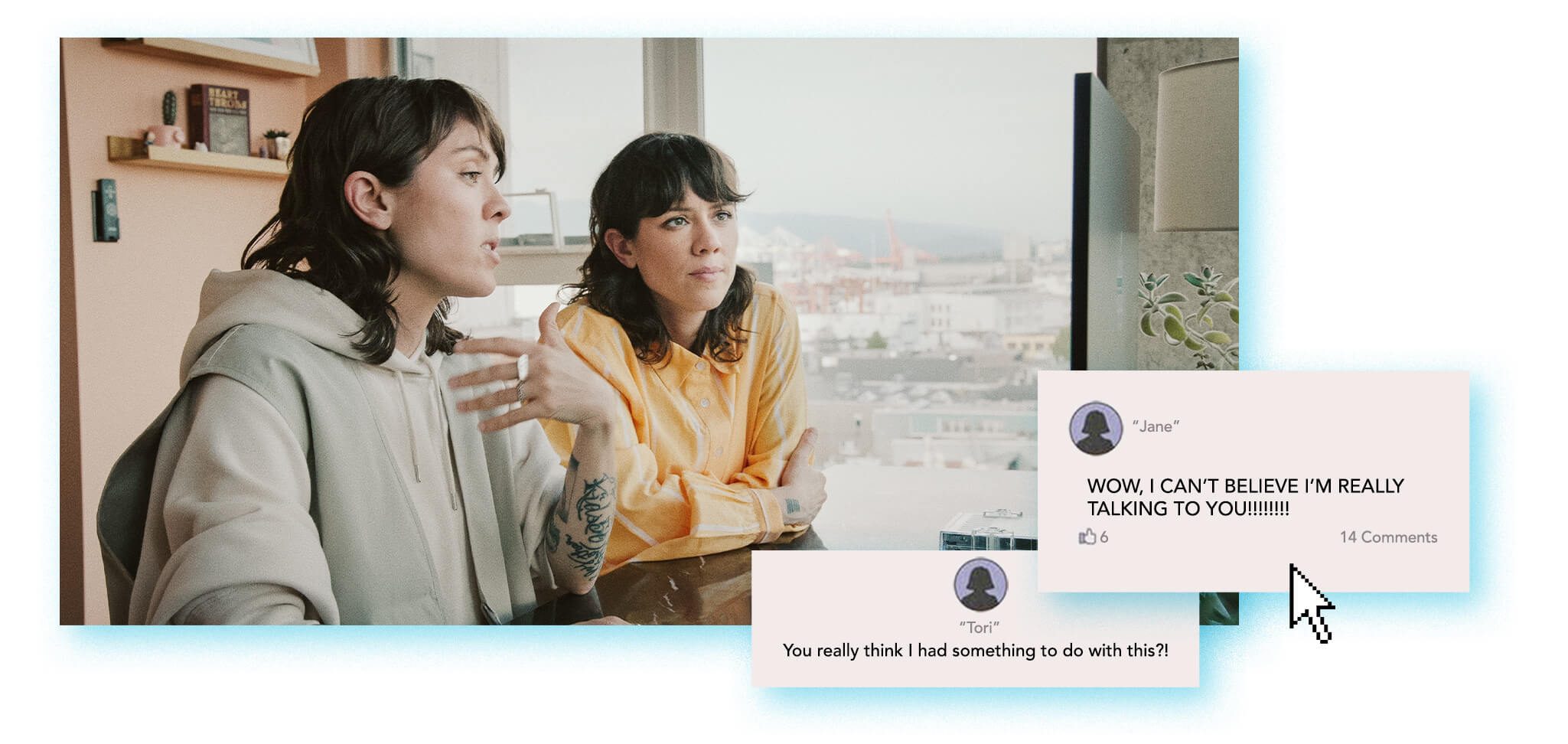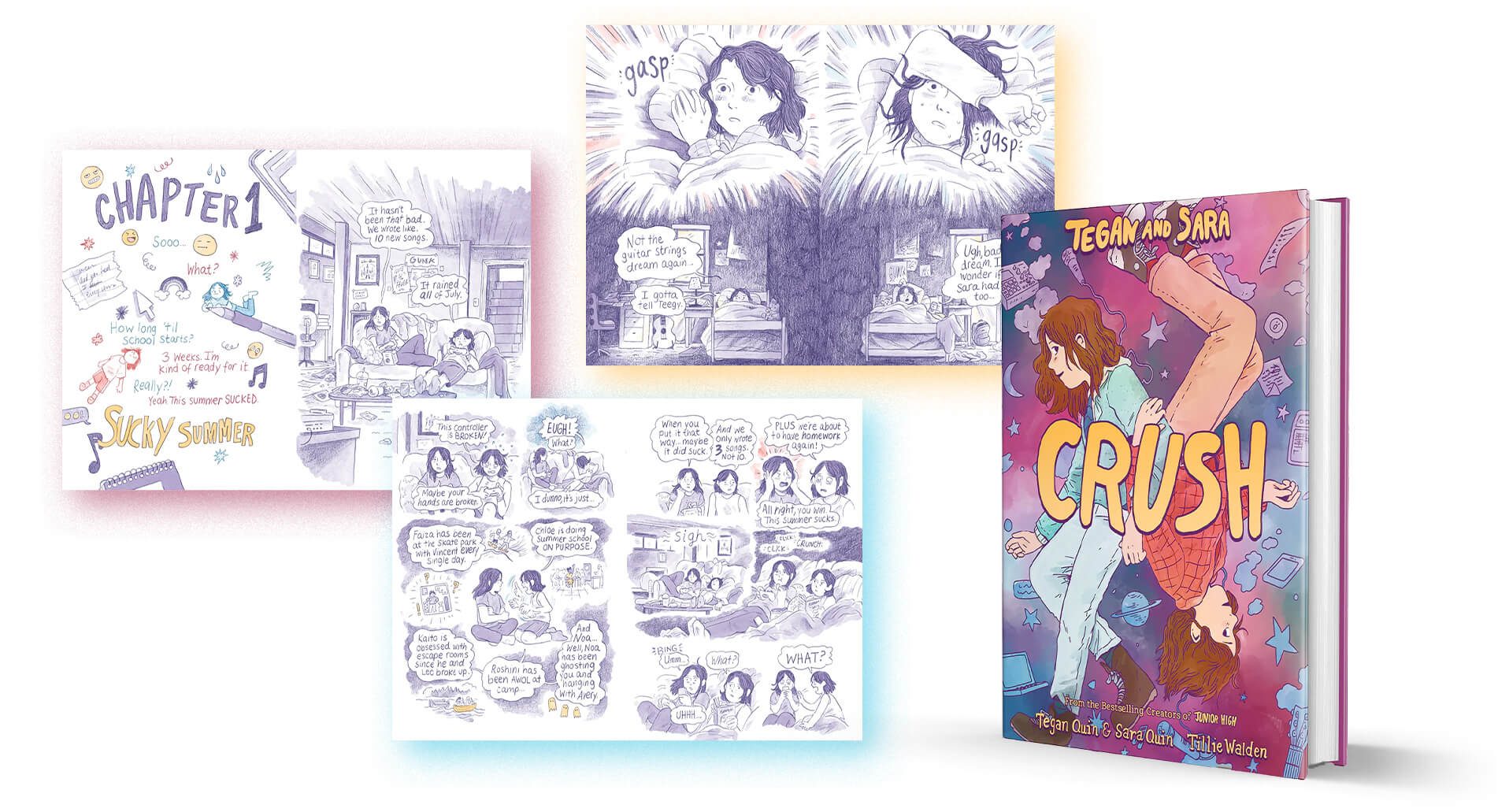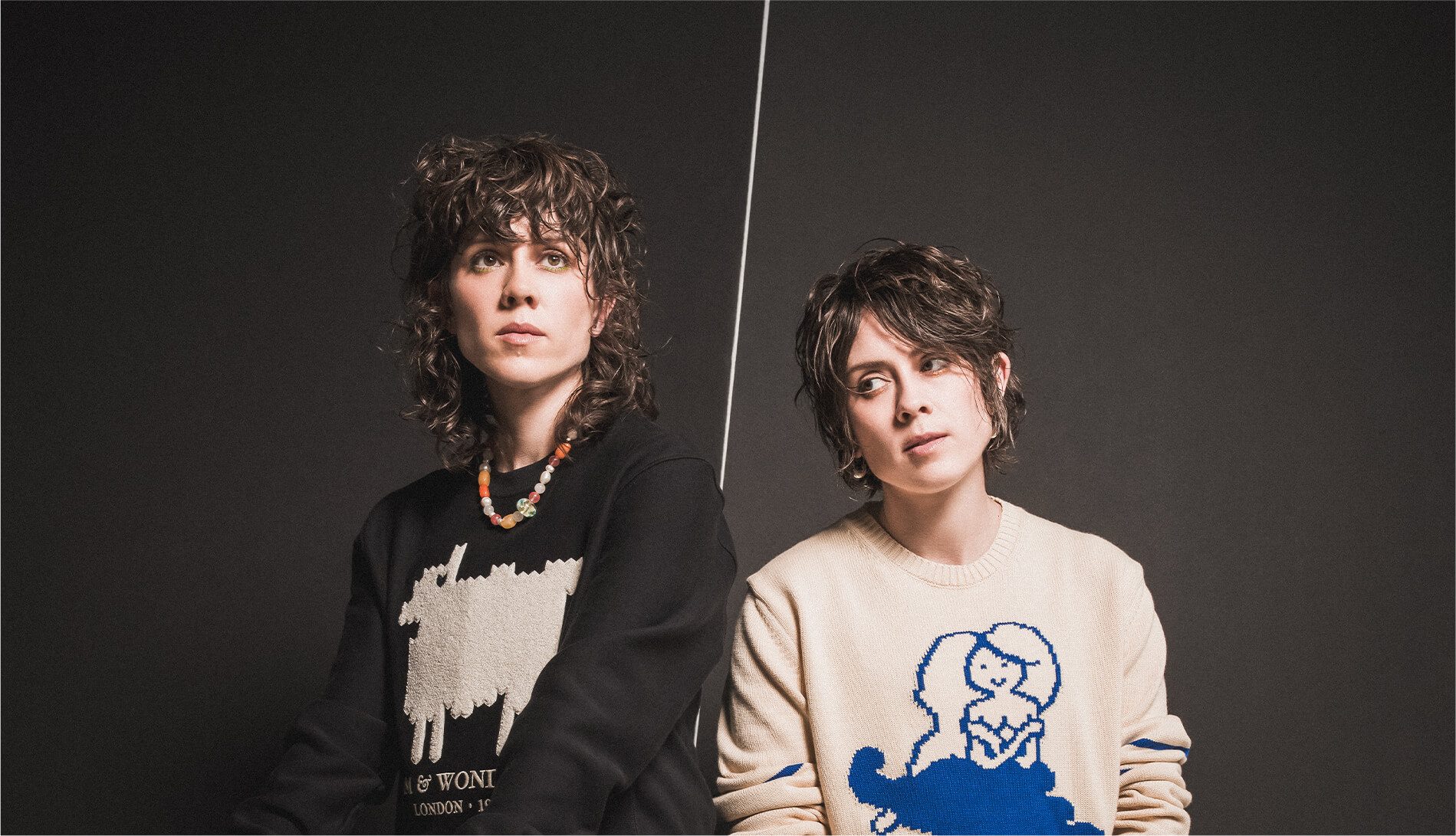I remember the first time I interviewed Tegan and Sara for Curve magazine. I was hiding out from my corporate day job, locked in a conference room waiting to be patched through to the iconic twins by a cadre of publicists and record label folks. It was the pre-video conference days when “phoners” were the norm if you couldn’t meet in person. I was talking to Tegan and Sara about their then-upcoming album, the glittering pop masterpiece Heartthrob.
Along with their new identity as bona fide pop stars, came the boundaries afforded to mainstream artists like Taylor Swift and Katy Perry (with whom they appeared onstage during the Heartthrob era). Gone were the days of signing autographs by the bus or hanging out at the merch table-their almost trademark accessibility to fans no more as a new era was ushered in…and many in their core fandom had feelings about it.
That’s not to say that they themselves had changed all that much. During my interview, they were the chatty, engaging, and astute Tegan and Sara we all got to know from their signature stage banter and YouTube videos which included segments like Forest Fone (where they would call friends and family from the studio where they recorded The Con), and candid Feelings Reports. The sisters had become icons in the LGBTQ+ community for a reason – their charming relatability and openness as out queer women was practically unprecedented at the time and created a rife environment for enthusiastic fans, many of whom had never seen a reflection of themselves on stage or in magazines.
As their mainstream star rose, I interviewed them again, and the boundaries around the band had grown. Now, with the release of their Hulu documentary Fanatical: The Catfishing of Tegan and Sara, fans are getting a shocking inside look into a horrifying ordeal that has haunted the band since 2011.
Talking with Tegan and Sara recently, both Zooming in from their respective homes, the pair reflect on the events that changed their lives, and sense of security, before the words “parasocial relationship” were in the public lexicon.
What at first appeared to be someone imitating Tegan on Facebook via a fake profile, turned out to be something far more sinister. The individual (identity unknown) was not only reaching out to fans through social media pretending to be Tegan (this person is referred to as “Fake Tegan” or “Fegan” throughout the documentary), they had gained control of Tegan and Sara’s email accounts, access to hard drives, demos, personal documents, photos, and even their mother’s medical information and had been sharing it with fans.
This profound invasion of privacy rocked the sisters and their inner circle, causing them to completely reassess their public personas and the cost of fame.
The new documentary, directed by Erin Lee Carr (Britney vs. Spears), takes an in-depth look at how Fegan impacted not only Tegan and Sara, but their fans. Many of Fegan’s victims believed they were having an intimate friendship (and in some cases romantic or sexual relationship) with the star. The film also assesses the cost of parasocial relationships gone too far.
When asked what made it feel like the right time to share this story, Tegan said she had been talking to a friend about what had happened and he was surprised, having had no idea that while the women were arguably at the peak of their mainstream success, there had been so much going on behind the scenes.
“People who didn’t know this story were shocked that this happened,” Tegan says. “But the second thing that really struck me was that I didn’t really remember a lot and that was probably some dissociative coping, you know? It was a crazy time and I hadn’t really sat down and been like what did I feel about what happened to me and what happened to us?”
When director Carr signed on, the idea evolved from podcast to documentary and the pieces fell into place.
“I think for me the green light moment happened once we started talking to the victims,” Tegan says. “I think that’s what propelled me forward. I was like ‘I want to talk to as many victims as I can. I want to understand what happened. I want to help them move on.’ I felt like I owed people a better answer about what happened.”
That spirit comes through in the film, despite the inherently complex themes of “fanatical” parasocial relationships and whether it is actually her responsibility to owe anyone anything. It is clear that Tegan deeply cares for people and outside of the trauma that Fegan inflicted on her, she was concerned about the many longtime Tegan and Sara fans that were catfished and manipulated in the process.
Many of the victims were thrilled to be developing what they thought were authentic, if not unlikely, friendships with one of their favorite artists. In fact, it was a victim, Julie, who notified Tegan and Sara’s management when Fegan sent a link and password to an iDisk that included demos, passport information, and photos of the inside of Tegan’s home, thinking something about the exchange seemed unusual. On the other hand, the victims who believed they had romantic or sexual relationships with Tegan seemed to be varying degrees of hurt and angry with the real Tegan for the actions of her imposter.

As the nightmarish reach of Fegan’s actions started to become known, the pair was working on the songs that would become 2013’s Heartthrob, the aforementioned album that would catapult them into a more mainstream limelight. I wondered if learning about Fegan impacted their creative process or even their desire to continue making music.
“I think it was part of a time in our career where we were thinking about getting more popular actually,” Sara says. “And as much as this was destabilizing and haunting and invasive, in some ways it gave us a sort of kick in the pants to be like ‘Okay, if we’re going to get bigger, we’re also going to have to recognize that it’s going to change our relationship to our audience.’ And maybe that’s not a bad thing.”
Talking about the intensity of fame, Tegan adds “People come up and they tell you the most personal things about them. They shake, they cry, they sweat on you. Some people cross the line and do awful, gross things, but most people just come up and say I love you. I can hardly say ‘I love you’ to my friends.”
With the discovery of Fegan came genuine fears for the duo’s safety and it became clear that things would need to change.
“I think that the lure of pop and the mainstream was that it would give us a license and excuse to put a bit more distance between us and some of the trappings of the scene that we were in. Which included these expectations that we could just hang with our fans and that we were friends and that we wanted to stand outside of the venue and just chill with people. I think that there was some relief in knowing that the more popular you got, the more unreasonable it was to think that you could do those things. So, in some ways it almost had an opposite effect on us than you would think,” Sara says.
It’s clear that while so many things have changed for them in their 20-plus year career, they are still the grounded, talented, and charismatic Tegan and Sara that inspired the frenzied fandom to begin with. They speak plainly about the highs and lows of success, but never with malice towards the genuine fans that have supported their various endeavors and iterations, from merch table hangouts to electropop records. Most fans, they are sure to add, have supported them from a healthy distance.
“In the movie we talk about the shift that happened around that time, but I don’t think that’s purely Fake Tegan related. By the time we finished Heartthrob and put out our next pop record, we were 35. Like, we were also fucking tired,” Tegan says, laughing. “I think we started to think about our life, the public sphere, mortality, family building. You know, I don’t want to live in a bus with my sister and eat McDonald’s every day.”
In the years since the discovery of Fegan, Tegan and Sara have released multiple albums, helmed a Clea DuVall-directed television show based on their memoir High School, and published a middle-grade duology which includes Junior High and the recently released Crush.

“We want to make art. We are constantly making things, but Sara’s got a kid and a partner she’s been with for a long time. I’ve been with my partner for almost ten years, and I want to be around her. I am trying to think about legacy in a different way. We have our foundation. We love writing books. Our parents are getting older. Our friends are getting older, like we’re getting older,” Tegan says, listing all their increasingly important priorities with equal parts panicked laughter and sincerity. “I feel like I want to have other experiences. I want to know what life is like outside of just being a band and being in the public eye.”
While the documentary primarily focuses on the impact Fegan had on Tegan and Sara and the victims, it is also a larger commentary on what it means to be a fan. In an age where we have more access to our favorite celebrities than ever via social media, the film takes an important look at the toll of celebrity on those who experience it, and encourages some reflection on what it means to be a fan and what is reasonable to expect from the artists we love.
“This did affect how I approached our career and how I saw fame and celebrity,” Sara says. “This really did affect how I felt about our fan base at large. This is going to sound really deranged, but I’m glad we have context now and that this has happened to a lot of other people because A) I feel less alone and B) we can talk about it in a familiar context. It has been cathartic.”
On a much lighter, but not entirely unrelated, note the pair recently published their latest graphic novel, Crush, the second in a duology. They collaborated with illustrator Tillie Walden to tell a fictionalized version of their middle school experience chronicling the highs and lows of their tumultuous eighth grade year. In the novel, the writers capture the excitement, overwhelm, and complexity of that time in life through the lens of coming out and the beginnings of their musical career.
Crush is a delightful read, only enhanced by the beautiful illustrations that bring the story to life.
“I think something that happened in our real life that we carried over into this book is that instead of hitting the gas pedal when it became obvious that we had something, our parents hit the brakes. They said ‘Slow down, finish school. This will be here later, and that instinct to create some boundaries and then also to support us in managing those boundaries had a profound effect on our career and on our life,” Sara says, referring to a similar theme from the book when the young Tegan and Sara were forced to confront the expectations of a new manager and their burgeoning music career.
“If you’re listening to your gut and your gut tells you that it’s feeling wrong, it’s probably not the right time. Tegan and I do have our feet on the ground. And because we’ve never seen our value as being attached to our bodies, fame, or success, we were able to turn away from opportunities and situations that may have made us more famous. Instead, we chose what made us feel good,” Sara adds of their decades-long career.
As the sisters continue to navigate this chapter, one thing is clear. They know who they are and what matters to them. From merch tables and tour buses to the Oscars stage, and everywhere in between, Tegan and Sara continue to be the queer icons we have always loved. Just don’t be weird about it.
Fanatical: The Catfishing of Tegan and Sara is now on Hulu. Crush is out now.

